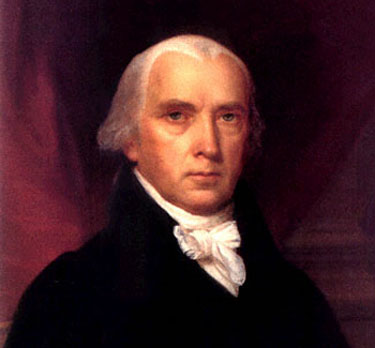 Last year I visited the Hall of Presidents at Disney World, home of the walking, talking animatronic presidents. In the anteroom where they hold you before the show starts, they had paintings of all the important early presidents.
Last year I visited the Hall of Presidents at Disney World, home of the walking, talking animatronic presidents. In the anteroom where they hold you before the show starts, they had paintings of all the important early presidents.
There was Washington. Then John Adams, the second president. Then Thomas Jefferson, the third president, Then the fourth president, James Monroe.
Wait. James Monroe? He was the fifth president. They’d skipped the fourth president, a short fellow named James Madison.
This burned me up. Washington has his obelisk. Jefferson has his memorial. Adams has his HBO mini series. And here we have Madison, whose birthday is March 16, and no one will celebrate.
There’s one particular reason I think this is unfortunate. James Madison is more responsible than any other single American for one of the nation’s greatest characteristics – religious freedom. At a time when we’re fighting over faith-based initiatives and the proper role of religion in politics, it’s worth appreciating that America’s experiment with religious liberty has largely succeeded, thanks largely to James Madison.
You’re probably aware that Madison is sometimes referred to as the Father of the Constitution for his pivotal role in guiding the Constitutional Convention. The original constitution took the historic step of forbidding Congress from limiting public office to people of a particular faith. That may seem obvious now, but at the time 11 of the 13 colonies had religious tests.
But consider this too:
It was James Madison who introduced into Congress the amendments that would eventually become the Bill of Rights. It was he who took the lead in ushering them through Congress and in particular fighting for a strong religious freedom clause.
It was also Madison who led the forces of religious freedom in one of the most important early battles on the topic. In 1784, Patrick Henry proposed that Virginians pay a tax to help support local churches. Madison led the opposition and successfully defeated this proposal.
And there’s the Virginia Statute for Religious Freedom. Thomas Jefferson famously listed this as one of just three things on his tombstone (a sure-fire way to insure you get credit for something). Jefferson did write this seminal document, but under his leadership it died in committee. Seven years later, while Jefferson was in France, Madison resurrected it and guided it through the Virginia legislature.
But Madison’s most important contribution to religious freedom was not legislative, it was theoretical. It really was Madison who shaped the most holistic and effective theory of what religious freedom was and why we wanted it. For Jefferson, it was often about protecting the political system from religious interference.
Madison’s emphasis was different. He believed that the main reason to have separation of church and state was to help religion. He came to this view in part because of an unusual but crucial alliance he built with evangelical Christians of his day. That’s right. At that time, the evangelical Christians were the leading SUPPORTERS of separation of church and state, and Madison was one of their greatest champions. They believed that not only was government repression bad but so was government help. Madison agreed and worked hand in hand with the evangelicals to press this point. In a crucial document called the Memorial and Remonstrance, Madison integrated the arguments of the Enlightenment intellectuals with the arguments of the evangelicals to create something much greater. Separating church and state would be better for BOTH state AND church.
This may be a concept that’s a bit jarring to modern culture warriors. We’ve come to think that if you’re pro religion you must surely want government to play a greater role in promoting religion. And if you’re in favor of separation of church and state that you must want to reduce religion’s role.
Madison and his evangelical allies had a completely different concept. They wanted to promote religion. They just believed that the best way to promote religion was for government to leave it alone.
This basic approach has made America one of the most religiously free and religiously vibrant nations in the world. Many people helped bring us to that point, but no one was more important than James Madison. Happy Birthday, Mr. Madison. You may not have a monument on the National Mall in Washington, but your spirit and ideas live in every house of worship in America.
First printed on WSJ.com Part of my shameless self-promotional drive for the paperback edition of Founding Faith. Buy it here. Please.
More from Beliefnet and our partners

